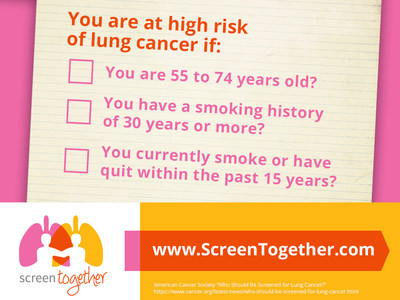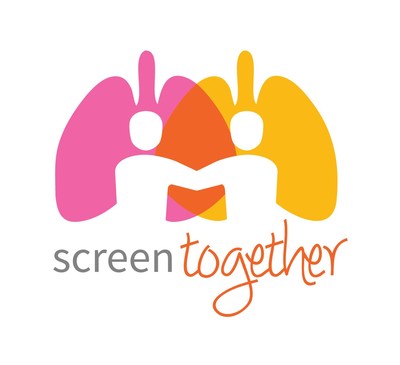Awareness Campaign Takes Lung Cancer Risk Head-On, Asking North Carolinians To Screen Together

Early detection of lung cancer through screening can dramatically increase survival for those at risk of the disease. At least 8.6 million Americans are considered high risk for lung cancer and are recommended to receive annual screening. If half of those high-risk individuals were screened, more than 13,000 lung cancer deaths could be prevented each year.1
"Lung screening with a yearly low-dose chest CT, accompanied by smoking cessation counseling, if needed, is the best way to identify lung cancer in its earliest and most curable stages," said
Current or former smokers between the ages of 55 and 74 in
"We are delighted to be working with the Lung Cancer Initiative to get the word out about the benefits of early detection of lung cancer," said
Lung cancer is the leading cause of cancer related deaths in
"Lung screening has now become an important part of our health maintenance with primary care but it is still frequently overlooked. This new campaign is a wonderful way for people to advocate for their health and do so with the support of others in similar circumstances," said
About Screen Together
Screen Together is an initiative that encourages those at risk for lung cancer to get screened along with a friend or loved one who may also be at risk. Through awareness activities, Screen Together aims to reach at-risk individuals where they live, work and play and inspire them to take charge of their health with the support of a friend, neighbor, colleague or family member and pledge to get screened for lung cancer at www.ScreenTogether.com.
In
About Lung Cancer Initiative of
As the state's leading non-profit organization supporting lung cancer research and education, the Lung Cancer Initiative of
About
Cautionary Note Regarding Forward-Looking Statements
This press release contains "forward-looking statements" within the meaning of the Private Securities Litigation Reform Act of 1995. Forward-looking statements can be identified by words such as: "anticipate," "intend," "plan," "expect," "believe," "should," "may," "will" and similar references to future periods. Examples of forward-looking statements include, among others, our plans with respect to expanding the program's reach and the potential benefits of our Percepta test. Forward-looking statements are neither historical facts nor assurances of future performance. Instead, they are based only on our current beliefs, expectations and assumptions regarding the future of our business, future plans and strategies, anticipated events and trends, the economy and other future conditions. Forward-looking statements involve
risks and uncertainties, which could cause actual results to differ materially, and reported results should not be considered as an indication of future performance. These risks and uncertainties include, but are not limited to: demand for our tests, the applicability of clinical results to actual outcomes; laws and regulations applicable to our business, including potential regulation by the Food and Drug Administration or other regulatory bodies; our ability to successfully achieve and maintain adoption of and reimbursement for our products; the amount by which use of our products are able to reduce invasive procedures and misdiagnosis, and reduce healthcare costs; the occurrence and outcomes of clinical studies; the timing and publication of clinical study results; and other risks set forth in the company's filings with the Securities and Exchange Commission, including the risks set
forth in the company's Quarterly Report on Form 10-Q for the quarter ended June 30, 2017. These forward-looking statements speak only as of the date hereof and Veracyte specifically disclaims any obligation to update these forward-looking statements.
1 2017 American Lung Association "Lung Cancer Fact Sheet" http://www.lung.org/lung-health-and-diseases/lung-disease-lookup/lung-cancer/resource-library/lung-cancer-fact-sheet.html
2 2017 American Cancer Society "Key Statistics for
3 2017 Center for Disease Control and Prevention "Lung Cancer Rates By State"
https://www.cdc.gov/cancer/lung/statistics/state.htm
4 2016


View original content with multimedia:http://www.prnewswire.com/news-releases/awareness-campaign-takes-lung-cancer-risk-head-on-asking-north-carolinians-to-screen-together-300521952.html
SOURCE
News Provided by Acquire Media